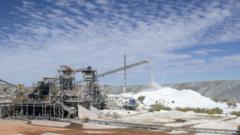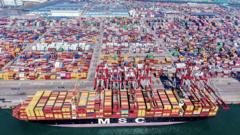In response to China's recent restrictions on rare earth exports, Australian Prime Minister Anthony Albanese has announced a significant investment strategy aimed at strengthening the country's position in the critical minerals sector.
Australia to Boost Rare Earth Production Amid China's Export Cuts

Australia to Boost Rare Earth Production Amid China's Export Cuts
Australia's Prime Minister proposes A$1.2bn investment in critical minerals to counter China's trade restrictions.
China’s recent halt on the export of seven key rare earth elements—integral to advanced technologies like electric vehicles and military equipment—has prompted Australian leaders to act. Albanese's commitment of A$1.2 billion (£580 million) towards developing a strategic reserve is poised to reduce reliance on China, which currently dominates the refining process of these vital resources.
Rare earths, comprising 17 elements necessary for modern technology, have made headlines as global demand continues to surge. With tech industries depending heavily on rare earth minerals for development, Australia aims to leverage its mining capabilities. The prime minister's proposal includes not just rare earths but also lithium and cobalt, positioning Australia as a key player in the global supply chain.
China’s restriction measures have drawn widespread scrutiny as potential retaliatory actions against tariffs imposed by the US. The reliance on Chinese rare earths has raised alarms, especially since the U.S. sourced approximately 75% of its imports from China in recent years. Experts note that Western countries have failed to secure their rare earth supply chains, creating vulnerabilities in areas such as defense.
Elon Musk has voiced concerns that the Chinese export halt is already affecting Tesla's development of advanced technologies, underscoring the immediate repercussions of these geopolitical tensions.
Though Albanese's strategy signals a proactive approach, analysts caution that the refining challenge remains unresolved. Australia has begun initiatives for local refining, with operations from Arafura Rare Earths and Lynas Rare Earths shedding light on domestic capabilities. However, estimates suggest that Australia will still depend on Chinese refining until at least 2026.
Looking ahead, analysts predict potential shifts in global market dynamics if Australia’s reserves become more accessible. Albanese's plan may not eliminate reliance on China entirely, but it could empower Australia to sell its resources strategically during economic turbulence, potentially influencing pricing power in the rare earth market.
While Australia positions itself to support its allies amidst rising tensions with China, uncertainty remains about the effectiveness of its efforts in the face of ongoing geopolitical challenges.





















